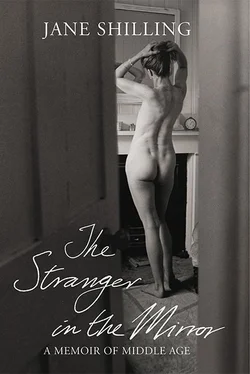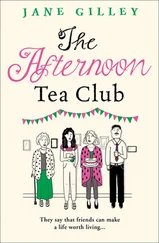You must have noticed, said Prudence, that this is what life is like at our age. Just when you think you’ve got a grip on one thing, something else goes wrong. Like dragon’s teeth: you sort out an intractable problem and another three spring up to take its place. It was true. Even during the past year, while I had been preoccupied with shoring up the breaches in the walls of my own existence, I had noticed that a wave of change had broken over my contemporaries, swelling silently behind us as we paddled about in the calm waters of our daily lives, the undertow catching us off balance and dragging us away over a bruising series of hidden rocks: divorce, bereavement, illness, debt.
With an abrupt shift of perspective, like a blurred image seen through a telescope coming into focus, I understood that all of us, in different ways, were being forced to learn the art of losing. The sense we had of ourselves when young as invulnerable, immortals with a superb mastery over our own destinies, was still recent enough for our instinctive reaction when things went wrong to remain that of astonished resentment. ‘The timing is terrible ,’ said a friend taken unexpectedly, outrageously, seriously ill. ‘It’s so inconvenient . In another couple of years, perhaps, when things were quieter, it wouldn’t have mattered so much. But at the moment. It’s just… not me .’
‘So many things seem filled with the intent/to be lost that their loss is no disaster,’ wrote Elizabeth Bishop in a poem cataloguing a series of wrenching losses survived – door keys, an ill-spent hour, houses, a lover, a continent, her mother’s watch… ‘Lose something every day,’ she wrote. That, I knew, we were all doing already without even trying. Time, in particular, but other things as well.
Soon after Christmas I saw my neighbour’s daughter come up the garden path. She was holding a black bundle. ‘Mum wanted you to have this,’ she said when I opened the door. ‘She’s getting rid of her bits.’ The bundle was a doll: one of the elaborately costumed tribe with which Violet’s front room was filled, like silent guests at a party. This one stared fixedly from green glass eyes with a silky fringe of eyelashes, an infinitesimal spattering of russet freckles across her china nose. She was dressed in a black velvet riding habit, laced black boots, a black veiled hat perched on a mass of reddish ringlets. From her china hand dangled a black whip, silk-bound. ‘Mum thought you’d like her because she’s dressed in riding clothes,’ said Sylvia.
‘But why is Violet giving away her dolls?’ I asked.
‘She says she don’t want them no more,’ said Sylvia.
While I was considering what to do with this macabre and infinitely touching souvenir the telephone rang. My sturdy, adventurous, redoubtable aunt, not long returned from a strenuous road trip around the Shetland Isles with a friend, had got tangled up with a small dog in a park and fallen, breaking her leg.
The hospital where she was being treated did not conform to the dire image of NHS hospitals often described in the press. The ward was clean, the nurses mostly kind and attentive. Yet it seemed to me a fearful place, filled with hulks of humanity, beached on their metal cots in the hot rooms like the decayed sail barges whose forlorn ruins, half sunk in the mud-flats around Oare and Milton Creek, I used to visit as a child with my grandfather.
Once all these old people had been babies; their tender fingers and the perfect curve of their cheeks piercing their mothers’ hearts with love as sharp as pain. They had skipped ropes and kicked footballs, learned grammar and fractions, made friends and enemies, kissed and fought and danced and made love, had children of their own, watched their parents and grandparents decay with pity and perhaps with impatience. Now they lay in their beds, toothless mouths agape, moaning a little in their dreams, or propelled themselves gallantly in wheeled chairs to the bleak common room, where a little black television perched high on a corner bracket chittered irritably to itself like a sick monkey.
What unnerved me was how quickly my proud and contrary aunt had learned to live by the rules of this place: her larger world contracted to the limits of her shared room with its cramped storage space and hard fluorescent strip light, the rhythm of her days marked by the oddly early hours of her mealtimes with their nursery names – breakfast, dinner, tea – her individuality subsumed into the role of a good patient: ungendered, trusting, compliant. The things that had made her distinctively herself – her intelligence, her questioning spirit, her scepticism of authority, even her femaleness – now represented impediments to the smooth running of the machine in which she was being processed. She must suppress them, or be thought difficult and suffer the consequences of that ominous adjective.
The realisation gave me a shock like a slice with a knife. I had thought, abstractly, of old age as involving a loss of independence, of advancing ugliness and feebleness – the chagrin of lost allure and the humiliation of physical decline. Perhaps, too, a certain blurring of affect (though the old people I had known well – all four grandparents, Violet and half a dozen more who had become close friends in one way or another – had all remained very sharply themselves). I had not, until now, considered that such basic instincts as modesty, curiosity or an opinion about the functioning of one’s own body might become luxuries as one approached the end of the journey.
I had thought of the term ‘second childhood’ as describing a personal medical disaster: a catastrophic decline in individual cognitive function. I had not considered that at 80, with one’s wits intact and nothing wrong beyond a broken tib and fib, one might be urged into that state of sexless, opinionless dependence by professionals for whom the combination of sound minds with unsound bodies is incompatible with efficient systems management.
Emerging from the stifling heat and wilful ugliness of the hospital, with its sickly pastel draperies and linoleum the colour of highly polished dung, into the compromised tenderness of a spring twilight in the Medway towns, the grind of traffic fighting with a late, lyrical blackbird as the sun set over the sluggish river and the metallic grey torrent of the motorway in a sky of pure violet, I was filled with a sense not of timor mortis but of a life not yet lived. The rise and fall of my breathing, the ache in my thighs where I had been gripping the saddle at the weekend, the shape of the crescent moon growing sharper in the darkening sky above the lurid glow of headlights and street lights all gave me an urgent sense of what remains as things fall away.
There are thirty years between my 80-year-old-aunt and myself; thirty years between my present self and the 20-year-old self that leaned against the honey stone of the sash window in the Oxford college, listening to the Four Last Songs and thinking about love. Thirty years since I was young, and thirty years more before I am old, if I should live so long.
‘I don’t think of the future, or the past, I feast on the moment,’ wrote Virginia Woolf in her diary. ‘This is the secret of happiness; but only reached now in middle age.’ Is that the secret? To eschew regret and apprehension alike? Perhaps.
There came a telephone call, asking me to attend the funeral of my old Latin teacher and, a month later, of her husband: Baucis and Philemon, the two old trees withering together. They had taken me in as a furious teenager, given me a home when I had lost one, tried to show me that hard work would give me a way out of the small-town dead end in which I was angrily struggling.
Twice in a month I drove the fifty miles from London, turned off the motorway on to the tree-lined street, unvisited in decades, where I grew up; retraced the route I walked every day to school and back. Woodstock Road, Park Avenue, Tunstall Road – the map of the suburban streets scratched on my heart, all but obliterated now by later superimpositions: St Giles, the Broad, the King’s Road, Peckham Rye, the Trafalgar Road and who knew where next.
Читать дальше












